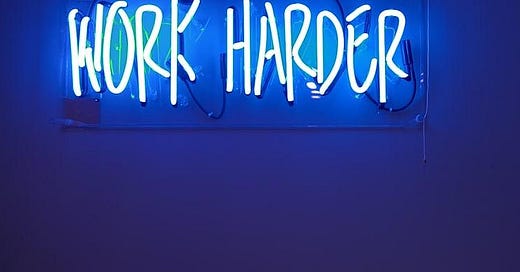I once gave up a sixth of a startup that eventually had a spectacular IPO and was worth over $4 Bn at its peak. All because I wanted to be able to work from home.
I argued that we should be focused on results, not effort and certainly not some woo-woo feeling of camaraderie when everyone happens to be in the same room.
This was way back in 1996. Ever since the pandemic, and remote work is now far more the norm, especially in tech circles where most work is done just staring at screens anyway, I feel kinda vindicated.
But of course, it’s a hollow justification. It’s hard to rationalize such a massive exit. Truth be told, the incident has left me pondering: effort or results - what matters more?
When it comes to simple, well-defined transactions, results are what counts. When I am paying for something on Amazon, it is rare that I ponder about the struggles of a warehouse worker or how many iterations the website has been redesigned.
My perspective started to change ever since I became a dad. The best advice I’ve read about motivating kids is Carol Dweck’s book The Growth Mindset. Dweck suggests we should be praising kids for their efforts and struggles, not their successes.
Focusing kids on their efforts contributes to more learning and improvement, whereas focusing on results indirectly incentivizes them to take up less challenging tasks leading to poorer performance.
This made me realize that, if we just focus on one round of a single game, then yes the outcome is paramount. But in the world of infinite games, where we are (re)writing the game each time we play it, perhaps focusing on effort is more important than results. Because a single game’s results are less important than the learning gained from playing that single game. This is especially relevant when this learning is compounded with each iteration of the game.
Results matter less too in situations where luck or chance plays a big role. In Nate Silver’s latest book On The Edge, poker players (and readers in general) are advised to “trust the process” rather than “wish for an outcome”. I learnt that even the 200th best professional poker player in the world should expect a negative year of earnings. So, a bad year’s results shouldn’t lead one to think they are bad at poker.
All these thoughts were swimming in my head as I struggled to write this piece when I discussed them with my idea gym partner
in our most recent and final Write of Passage class.She asked a central question: Why are you writing this essay?
It was only then that I realized that I am still wistfully wondering: did I make a mistake? In an alternate universe, certainly I should have accepted my friend’s generous offer that led to literally a billion dollar opportunity?
In spite of this billion dollar reality staring in my face, and in spite of my now more nuanced understanding of effort versus results, I don’t feel like I’ve made a mistake. Why is that?
This may simply be rationalization or cope: but I think the argument of effort versus results and whether I should be allowed to work from home belied a deeper undercurrent.
Back then, my friends and I were meeting up and working on the side (and thus remotely) for over a year before we decided to go full time. If I were entrusted to fulfill one sixth of the company’s potential, why wouldn’t they have trusted me if I wanted to work from home once in a while?
My gut was telling me that my friends and I were lacking the chemistry to work together fully, or maybe I wasn’t totally bought into the company vision. All this meant that I wasn’t able to put my best efforts and energy into this startup.
It is hard to envisage the counter-factual, but it could well be that had I joined Interwoven, the company may not have been such a spectacular success and it would have been on me!
Shortly after I declined joining Interwoven, I started AdKnowledge with a different founder. He had no problems wherever I worked and strangely enough, we worked together in the same confined office space 5-7 days a week. I gave it my all, and in spite of many moments of frustration and defeat, it was an unregrettable experience. AdKnowledge would later be acquired for $200 Million.
The human mind is mysterious. It creates for itself layers of obfuscation so that our true motivations are so easily hidden from ourselves. Peeling these layers is a lifelong journey. I am happy to humble brag that I wrote this piece from home.
=====
I’m been having fun with Google’s NotebookLM and it’s eerie ability to produce podcasts on any topic. Here’s one for my first 3 pieces in case you’ve not read them:
It’s kinda with mixed feelings of awe, pride and fear that the audio sounds more interesting than my essays!
🙏🏽
Patrick McMahon, Bhavani Ravi



The “I am happy to humble brag that I wrote this piece from home” got me too lol
Your effort here in this essay is good and so are the results 💃🏻
Your essays are still some of my favorite.